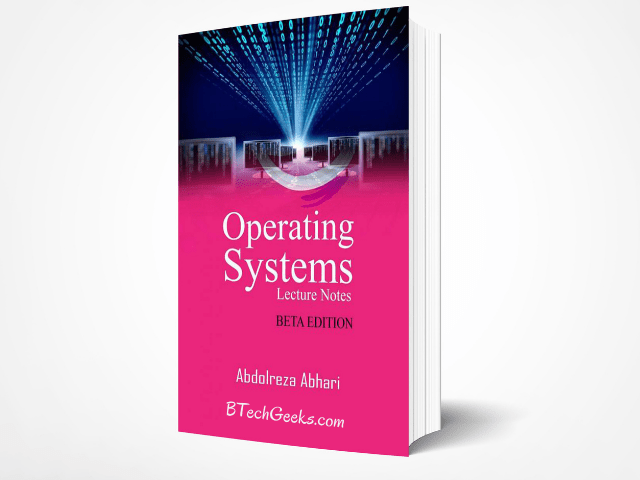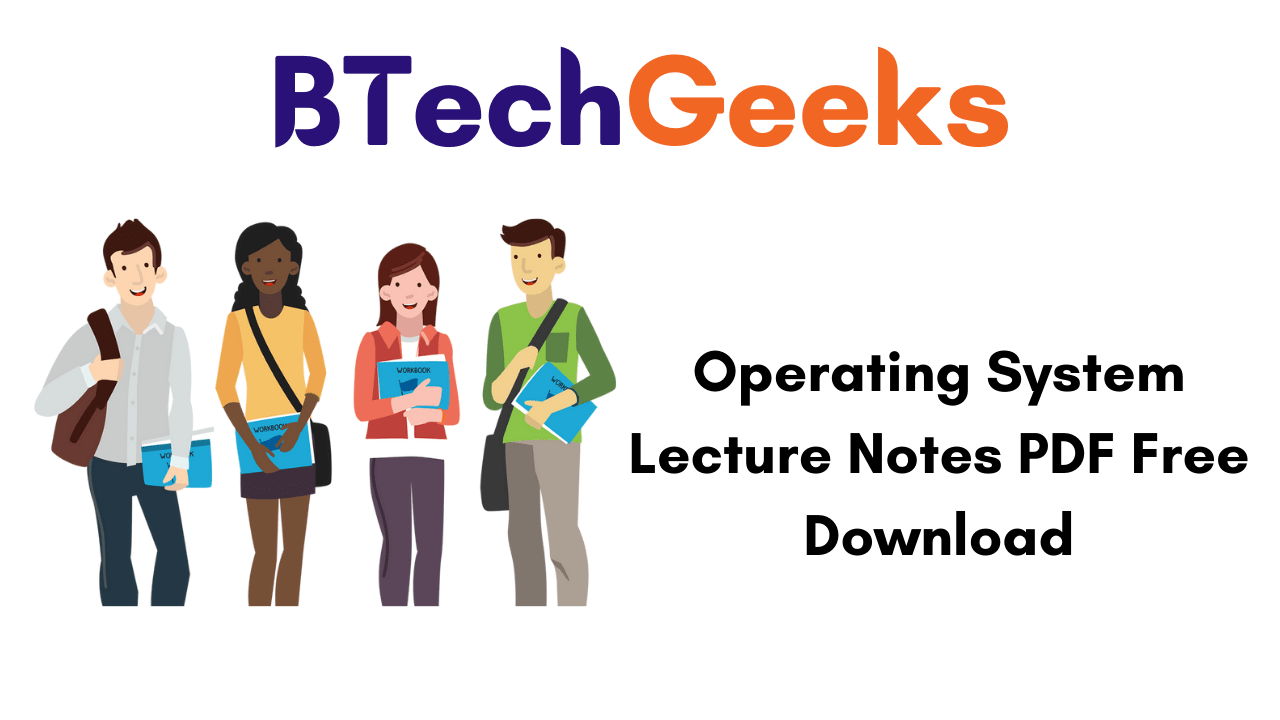Operating System Study Notes: Are you looking for Operating System (OS) Lecture Notes and Study Materials? Then, this article is your lifesaver as you can avail the best notes, reference materials, and the list of essential questions for your preparation process with all the essential concepts.
Operating System Lecture Notes and Reference Study Materials is a predominant tool that fosters and amplifies your preparation, helps students score better grades, and gives a brief comprehension of all the essential concepts falling under Operating Systems. Students can refer to and avail the Notes and Reference Study Materials on Operating Systems as per the latest curriculum from this article.
Graduates hold a significant advantage with Operating System Lecture Notes as you will acquire the latest and updated Syllabus, Reference Books, and the list of all the Important Questions for Operating System Lecture Notes over regular class notes.
Students can obtain from Operating System Lecture Notes PDFs and Reference Books from this article and use compatible preparation approaches with the best and updated study resources and achieve high ranks.
- Introduction to Operating System Lecture Notes
- Operating System Lecture Notes and Study Material PDF Free Download
- Operating System Lecture Notes Reference Books
- Operating System Lecture Notes Updates Syllabus
- List of Operating System Lecture Important Questions
- FAQs on Operating System Lecture Notes
- Conclusion
Introduction to Operating System Lecture Notes
Operating system lecture note: Operating System is software that acts as an affiliate between the computer hardware and the end-user. Every Computer system must have at least one Operating System like Microsoft Word, or Chrome, or Games so that it fosters an environment that performs the task.
Operating System platforms communicate between the user and the device and helps the user understand the programming language. A user can’t operate a computer devoid of an Operating System.
A few examples of Operating System is iOS (15.44), Windows Phone OS (0.06), windows(40.36), Chrome oS (0.14), Android (37.95), etc.

Operating System Lecture Notes and Study Materials PDF Free Download
Students can find the Operating System Lecture Notes and Study Materials updated in this article. Students can aid your preparation with the ultimate preparation tools to help you procure better marks.
Students can download the study materials and notes and read through them during the revision or preparation process. The utilization of Operating System Lecture Notes and Study Materials as a source of reference will help graduates get a better overview of OS concepts and topics and help them change the score game.
Here, are a list of a few all the essential notes for comprehensive preparation of an Operating System course program
- Operating System Lecture Notes for CSE PDF
- Operating System Lecture Notes PDF
- Operating System Previous Year’s Question Papers PDF
- Operating System Handwritten Lecture Notes PDFs
- Operating System Programme Question Paper PDFs
- Operating System Lecture PPT Notes PDFs
- Operating system notes
- Operating system notes pdf
- Operating system notes for bca
- Operating system notes pdf download
- Operating system notes pdf for diploma
- Operating system notes in hindi
- Operating system notes pdf for mca
- Operating system notes module 1
- Operating system notes ppt
- Operating system notes pdf for bca
- Windows operating system notes
- Disk operating system notes
- Cs8493 operating system notes
- Bca operating system notes pdf
- Introduction to operating system notes pdf
- Advanced operating system notes
- Windows operating system notes pdf
- Introduction to operating system notes
- Network operating system notes
- Disk operating system notes pdf
Operating System Reference Books
Books are a rich and abundant load of information, and graduates should ensure that you confer to select the right books that provide excellent conceptual background. Students can avail the best sources of reference books for an Operating System as per the subject experts’ recommendations.
Graduates can refer and read through Operating System Books and other sources that assist them during their preparation.
The list of most recommended and best books for Operating System subject preparation are as follows, and students can select the book that meets their knowledge to prepare accordingly.
- Book on Operating System Concepts by Avi Silberschatz and Peter Galvin
- Operating Systems- A Modern Perspective Book by Gary J Nutt
- William Stallings’s Book on Operating Systems- Internals and Design Principles
- Book on Operating Systems by Archer J Harris
- Operating Systems- A Concept-Based Approach Book by D M Dhamdhere
- Andrew S Tanenbaum’s Book by MODERN OPERATING SYSTEMS
- Book on Design of the Unix Operating Systems by Maurice Bach
- James Farber and Ken Rosen’s Book on Unix – The Complete Reference
- Operating System Concepts- The Sixth Edition of Windows XP Book Update by Silberschatz Galvin Gagne
- Book on Operating System- A Design-oriented Approach Book by Charles Crowley
- Tom Carpenter’s Book on Microsoft Windows Operating System Essentials
Operating System Updated Syllabus
The best way to make your preparation effective is with an initial idea and an outline of an Operating System Syllabus. Keeping in mind every student’s requirements, we have provided a detailed view of an OS Subjects curriculum.
Course Curriculum will give students a clear idea of what to study, and the chapter-wise break up gives topics under each unit carefully and allot time to each topic.
Students must cover all the topics before attempting the Operating System exam so that the paper is reasonably comfortable at the time of exams. Candidates must ensure awareness of the Operating System Syllabus as it prevents you from wasting unnecessary time on redundant topics.
The updated chapter-wise breakup of the OS Syllabus is as follows-
Chapter 1- An Overview of Operating Systems
- A Brief History of Operating Systems
- An Introduction to Operating Systems
Chapter 2 – Basics and Background of Operating Systems
- The Structures of Operating System
- Basics of Operating Systems- Multi programmed Batch, Batch, and Timesharing
- The Structures of Computer System
- A Review of Computer System- Instruction Cycle, Architecture, and Process Control Block
Chapter 3 – Processes of Operating Systems
- Definition of processes
- Various Threads
- Process Structures- PCB and Components
- Process States- The Five States Model
- Operations on Processes
Chapter 4 – Computer Process Unit (CPU) Scheduling
- Algorithms- Priority Scheduling, The First Come First Serve Concept, Round Robin, and Shortest Job First
- I/O Burst Cycle
- Scheduling Criteria
- Context Switching
- Scheduling- Long Terms and Short Terms
Chapter 5 – Process Synchronisation
- Two Process Solutions- Algorithm Part I, Algorithm Part II, Algorithm Part III, and Bakery Algorithm
- Deadlocks and Starvation
- Critical Section Problem- Races and Mutual Exclusion
- Classic Synchronisation problems- Dining Philosophers and Readers or Writers
- Synchronisation Hardware- Swap and Test and Set
- Semaphores
Chapter 6 – Deadlocks
- Resource Allocation Graphs
- System Model
- Handling of Deadlocks- Avoiders, Banker’s Algorithm, and Prevention
- All necessary Conditions for a Deadlock- No Preemption, Mutual Exclusion, Circular Wait, and Hold and Wait
Chapter 7 – Memory Management
- Thrashing
- Address Binding- Compile Time, Execution Time, and Load Time
- Swapping- Contiguous Allocation- Multiple Partition (Worst Fit, First Fit, and Best Fit), Internal and External Fragmentation, and Single Partition
- Virtual Memory and Paging- Page Replacement Algorithms- FIFO (Belady’s Anomaly), MFU, Optimal, and LRU; Demand Paging, Basics, and Page Replacement
Chapter 8 – Storage
- Protection
- Files- Operations, Access methods, Attributes, File Types, Structures, and Operations
- Directory Structure
Chapter 9 – File System Implementation
- Free Space Management
- Allocation methods
Chapter 10 – Secondary Storage Structure
- Disks- Scheduling and Structures- FCFS, SCAN, and SSTF
List of an Operating System Important Questions
Students can refer and read through the list of essential and crucial questions mentioned below for the Operating System course program. All the given review questions aim to help the graduates excel in the examination through comprehensive preparation.
- State the difference between a process and a Job.
- Please write a short note on Time Slicing and state how its duration affects and impacts the overall working process of a system.
- Explain in detail the relationship factor between Computer Hardware and Operating Systems.
- Name a few crucial advantages of Multiprogramming.
- Explain in detail the different allocation algorithms.
- Write a short note on Semaphores
- State a few user inconveniences faced during the interaction with a Computer System that is devoid of Operating Systems.
- Build a comparison between Multiprogramming and Multiprocessing.
- Explain the HRN- Highest Response Ratio Next Scheduling.
- The contrast between Segmentation and Paging.
- State the main differences between Time-Sharing System and Real-Time System
- Write a short note on how Buffering improves the performance of a Computer System.
- Explain Process Scheduler and write a brief on the characteristics of a good Process Scheduler.
- What is Pseudo-Parallelism and write a short note on the process model that eases the working of the model.
- State the primary differences between a Distributed operating System and a Network Operating System.
FAQs on Lecture Notes of the Operating Systems
Question 1.
What is the importance of an Operating System?
Answer:
An Operating System is a necessary software used to run the Computer. It allows users to communicate with the Computer irrespective of the complex programming languages.
Operating System manages the software and hardware along with the Computer’s processes and memory.
Question 2.
How do reference books boost knowledge on Operating System?
Answer:
Books are an essential source of information, and graduates should ensure that they choose the right reference books to acquire excellent conceptual backgrounds. Students can avail the best sources of reference books for an Operating System as per the subject experts’ recommendations to refer and read through and assist in the preparation.
Question 3.
What is the difference between an Operating System and an Application Software?
Answer:
The primary difference between an Application Software and an Operating System is that an Operating System is a system software program that works well as an interface to the hardware and the user, whereas, an Application Software is a program that performs specific tasks.
Question 4.
What are a few crucial questions that help during the exam?
Answer:
Important questions aim to help graduates excel in the examination through comprehensive preparation.
- Name a few crucial advantages of Multiprogramming.
- Explain in detail the different allocation algorithms.
- Write a short note on Semaphores
- State a few user inconveniences faced during the interaction with a Computer System that is devoid of Operating systems.
- Build a comparison between Multiprogramming and Multiprocessing.
Conclusion on Operating System Notes
The information on Operating System Lecture Notes is a credible and reliable source that aids knowledge and understanding of the subject during revisions or preparations at the time of examination. Students aiming to excel well and score high grades in their examination can refer and practice from the provided Operating System Lecture Notes, Books, Study Materials, and Important Questions from this article.

